The following article is part of an ongoing series of analyses based on the recent Asia Matters for America Public and Elite Opinion poll. See all articles in the series here.
A recent poll conducted by NORC at the University of Chicago on behalf of the East-West Center has shown significant regional differences exist in perceptions concerning economic engagement with Asia, with elites [1] in the Western United States [2] – along with the general population – much more likely to believe economic engagement has been beneficial and important to their state than the same groups in other parts of the United States. However, economic ties between the United States and Asia are much more spread out across the country than the respondents’ answers would indicate. This suggests a disconnect from the perceptions and realities of the United States-Asia economic relationship which is exacerbated outside of the western United States. The results of this poll also highlight the disconnect between elites and their constituents regarding the economic benefits accrued from both trade and investment between the United States and Asia.
Respondents in the Western United States, both elites and the general population, were more likely to believe the state of the economy in Asia was important to their state compared to other regions in the country. However, even in the Western United States, elites were more likely than the general population to believe that the state of the economy in Asia was important to their state. In total, 56% of elites in the Western United States responded the state of the economy in Asia was important to their state “a great deal/a lot” – the only region where a majority of elites responded as such – whereas 29% of the general population in the Western United States shared this view.
At the opposite end of the spectrum, only 12% of respondents in the general population in the Southern United States believed the state of the economy in Asia was important “a great deal/a lot” to their state, compared with 37% of elites in the region. These responses are despite robust job creation and investment tied to Asia in the Southern United States, with over 155,000 jobs in Texas supported by exports to Asia and Georgia, Florida, Tennessee, Virginia, North and South Carolina all having more than 20,000 jobs supported by exports to Asia.
HOW MUCH DOES THE STATE OF THE ECONOMY IN ASIA MATTER TO YOUR STATE?
*Percentage of Adults
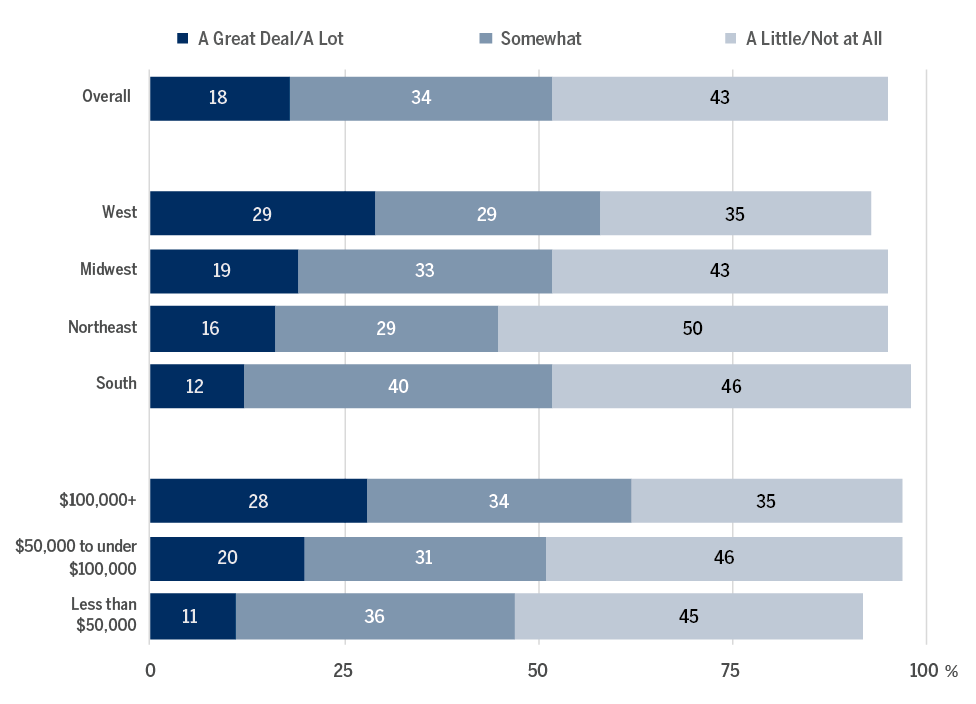
HOW MUCH DOES THE STATE OF THE ECONOMY IN ASIA MATTER TO YOUR STATE?
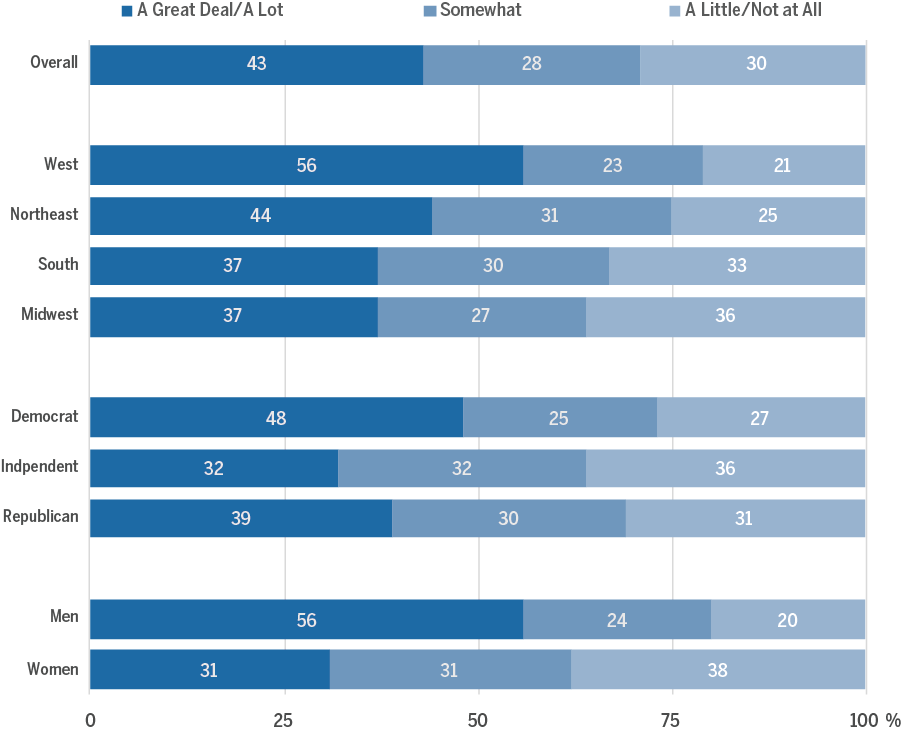
According to Trade Partnership, in 2019 exports to Asia supported an estimated 1.9 million US jobs, and in 2018 exports from Asia supported 2.5 million US jobs. While Western states such as California, Washington, and Oregon all have large numbers of jobs supported by exports to Asia, such jobs are not concentrated on the West Coast. As can be seen in the map below, states across the country have large numbers of jobs which are tied directly to exports to Asia.
JOBS DIRECTLY SUPPORTED BY EXPORTS TO THE INDO-PACIFIC
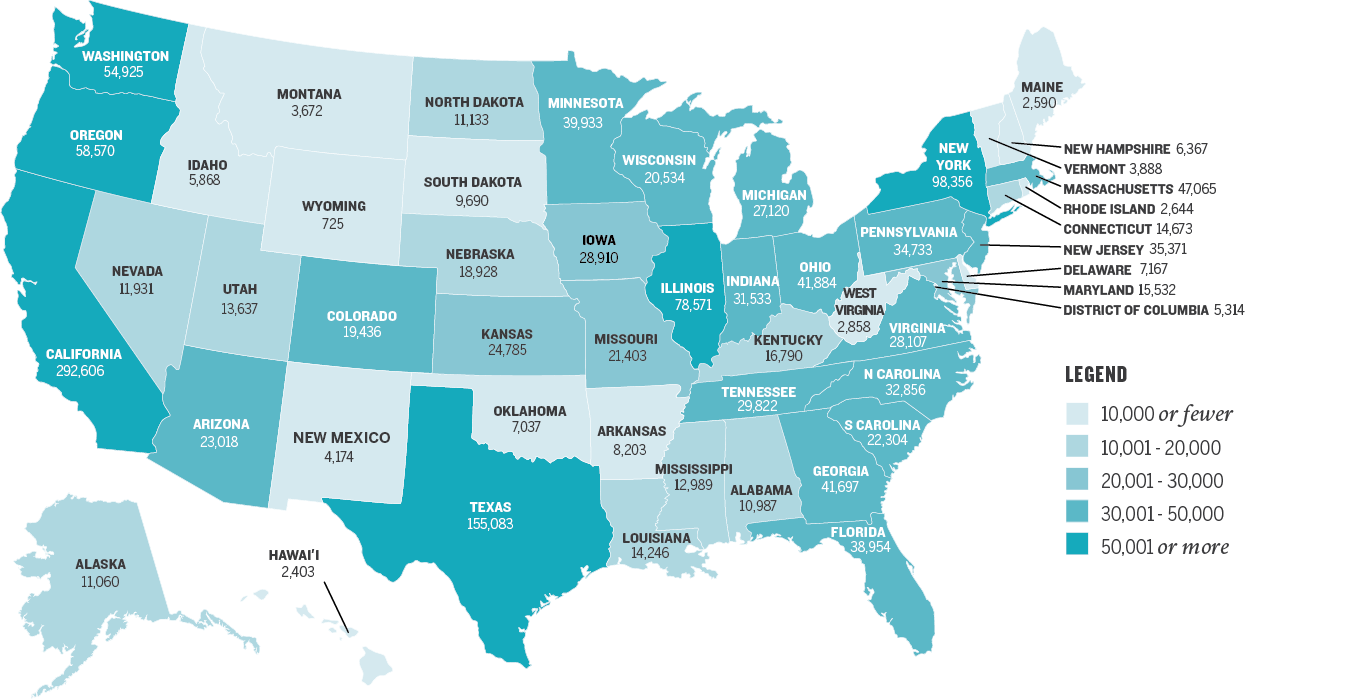
Elites in the West, Northeast, and South were more likely to believe trade with China and the rest of Asia had created jobs than those in the Midwest. However, both in the general population and among elites, large percentages of respondents were unsure of how many jobs in their state were tied to trade with Asia.
[CHINA] HOW MANY JOBS HAS TRADE WITH EACH OF THE FOLLOWING CREATED IN YOUR STATE? (left-hand graph)
[ASIAN COUNTRIES EXCLUDING CHINA] HOW MANY JOBS HAS TRADE WITH EACH OF THE FOLLOWING CREATED IN YOUR STATE? (right-hand graph)
Percent of elites*

There is a large regional difference in how many jobs respondents in the general population believed trade with Asia had created. As can be seen in the charts below, 19% of respondents in the western United States believed trade with China had created “a lot of jobs”, and 12% said the same for the rest of Asia. According to 43% of elites in the West, investment from China has been “very/extremely beneficial”, and 46% said the same for other Asian countries. This reflects the significant investment Western states have seen from Asia. Over the last 20 years California has seen $36.9 billion in investment from Asia, with Arizona receiving $16.1 billion, Nevada $5.9 billion, and Washington $3.9 billion. Elites in Southern states were less likely than their peers in the West to say investment from Asia was “very/extremely beneficial”. Only 32% of Southern elites saw investment from China as “very/extremely beneficial” and 33% said the same about investment from the rest of Asia. Yet, over the last two decades, Texas has received more foreign direct investment from Asia than any other state – almost $61 billion in total – while other Southern states have also received large amounts of investment including Louisiana ($24.7 billion), Georgia ($16.5 billion), Tennessee ($13.2 billion), and Alabama ($13 billion).
INDO-PACIFIC GREENFIELD INVESTMENT IN THE UNITED STATES
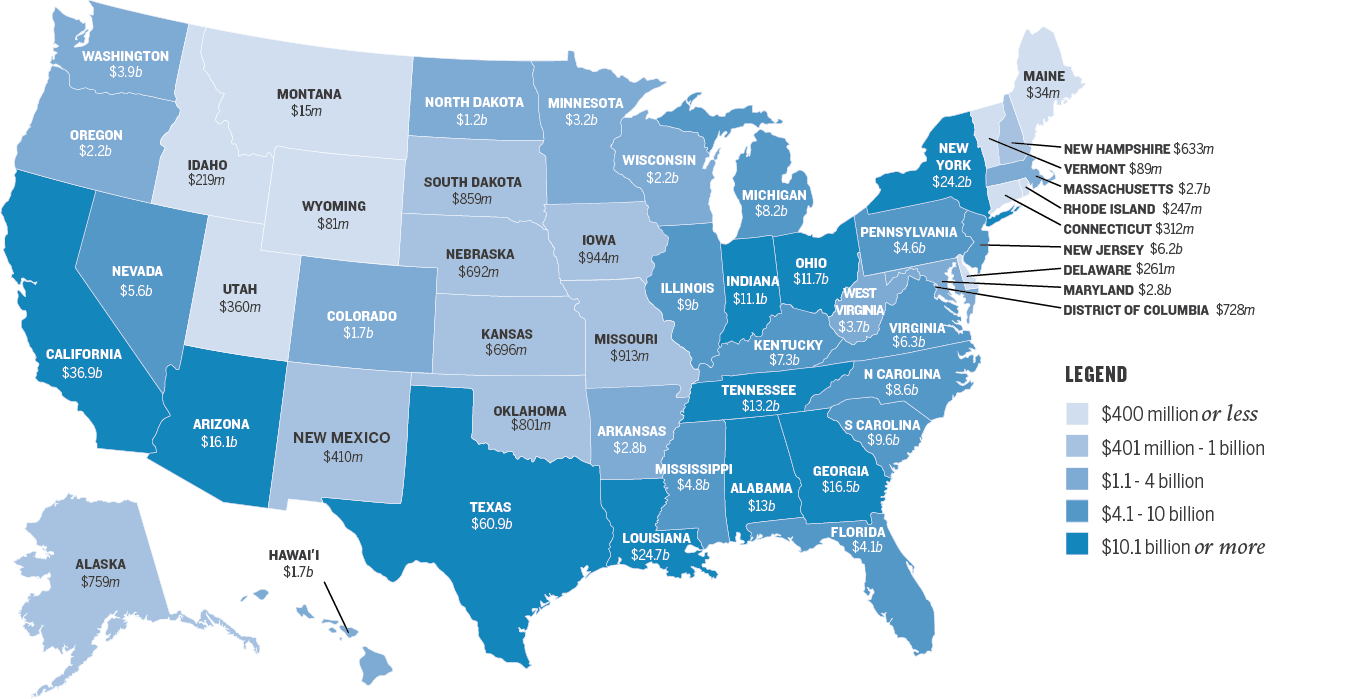
In general, elites were most likely to believe China had invested the most in their state, followed by Japan and South Korea. However, according to FDi markets, since 2003 Japan has invested more than double the amount in the United States as China has with over $136 billion in investment, followed by South Korea at $72 billion, and China at $59 billion.
WHICH COUNTRIES IN ASIA HAVE INVESTED THE MOST YOUR STATE?
Percent of elites*
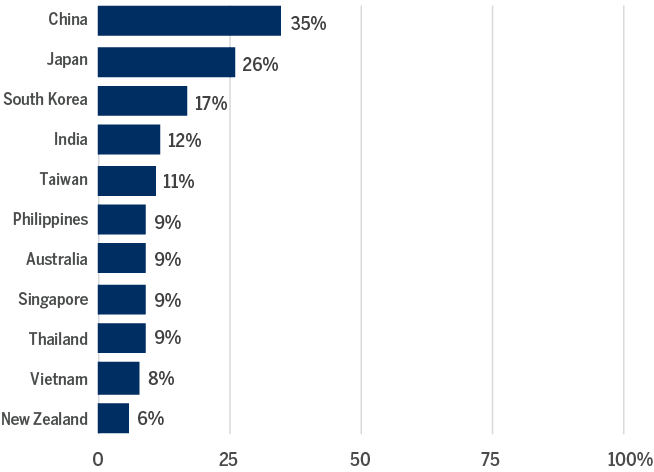
INDO-PACIFIC GREENFIELD INVESTMENT IN THE US (2003-2021)*
Capex (Billions)
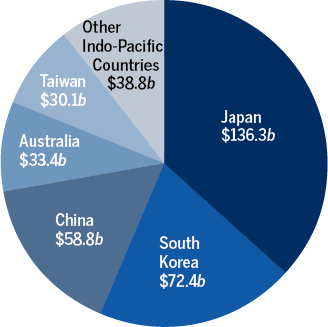
* Data from fDi Markets
It is disconcerting while the economic benefits of trade and investment between the United States and Asia has been spread across the United States, there are vast regional differences in how the relationship is perceived. Even in the western United States where the general population is the most likely to be aware of the benefits of the relationship, there is a large disconnect in views between elites and the general population. While some differences should be expected between the general population and elites who are more likely to be directly exposed to the benefits of the US-Asia economic relationship, the large differences demonstrated in this poll are worrying for economic policymakers. Furthermore, the regional differences indicated in this poll suggest the burden to support more economic engagement may fall largely on policymakers from western states, even though the benefits accrue nationwide.
Spencer Gross is a Programs Coordinator at the East-West Center in Washington.
Asia Matters for America Poll Analysis is a series of short articles exploring the results of the recent survey by the East-West Center and conducted by the NORC at the University of Chicago on American perspectives on US-Asia relations. Authors examine a segment of the results from the report regarding trade, tourism, international students, immigration, human rights, national security, and sister city relationships to attempt to understand how Americans believe Asia matters to their state.
[1] Elites: For the purposes of this survey "Elites" is defined as elected and appointed officials, bureaucrats, and business leaders. 1,446 people representing these three sub-categories answered the survey.
[2] Please refer to the map on page 4 of the report.